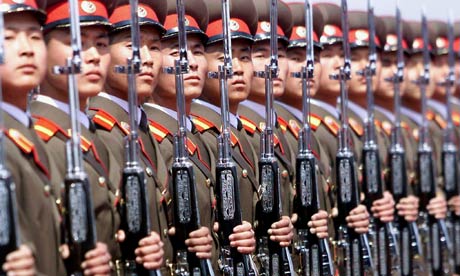
The agreement arrived at by the United States and North Korea last week, during secret negotiations in China, could be more than just a “positive first step” toward the denuclearization of the Korean Peninsula, as characterized by a White house spokesman; it may already be one of a good size. Pyongyang has agreed to suspend its nuclear tests and its uranium enrichment activities in central Yongbyon, north of the capital, opening it, moreover, to the inspectors of the United Nations International Atomic Energy Commission, in exchange for the proverbial “lentil stew.”* In this case the United States will be dispensing “supplementary food” to the pariah country, where 1.5 million people died from starvation in the 1990s and where malnutrition affects 25 percent of the inhabitants (and 47 percent of the child population).
It must be true, but not the whole truth, that this particular Stalinist-monarchist dictator of North Korea literally needs to feed the loyalty of his subjects this year, while the regime is preparing to commemorate, with huge events and demonstrations of prosperity, the hundredth anniversary of the founding of the country by Kim Il Sung, venerated as a father-god. The celebrations will be the first big test for the grandson, Kim Jong Un, about 28 years old, who inherited power last December with the sudden death of his father, Kim Jong Il (almost prophesied by the creator of the dynasty). The appearance of affluence would show him to be in a position to follow in his predecessor’s footsteps. It is impossible to know if Jong Il was already thinking of the future of his son or his own glory when he authorized a return to conversations with the Americans in July 2011, but the fact is that his heir (or whoever is his mentor) hurried to bring this to fruition.
In this way, he has sent a sufficiently clear signal to be seen not just in Pyongyang and Washington, but also in Seoul, Beijing, Tokyo and Moscow, the capitals of the sextet directly involved with the Korean question. This suits him, at least at the beginning of his rule, before there is any further expansion of belligerency. As a matter of fact, there are poles between which there has been a lot of uneven movement in North Korea’s foreign policy. In recent years, in this sense, the foreign policy has been more tense and rigid. In 2003, the regime abandoned the Nuclear Non-Proliferation Treaty, which it had signed in 1985, and announced its intention to make a bomb. In 2006, contrary to promises, it exploded its first device. It repeated with another dose in 2009, after expelling UN inspectors and quitting talks with the Group of Six. These incidents multiplied and were followed by the sinking of a South Korean corvette in waters disputed between the two countries.
Pyongyang has a stock of six to eight plutonium bombs and a number of unknown missiles with a range of 5,000 kilometers. With 1.2 million soldiers, its army is the fourth largest in the world. In reality, in both its actions of hostility and appeasement, North Korea always had one sole strategic objective: to be recognized and treated as an equal among equals by the great powers of the world. Nothing less than this will calm the paranoia of the drivers of this state, which became a pariah due to its own isolationism and by encouraging a destabilization of international order – a bizarre way to seek the respect of others, but this is how the most inscrutable and murky political system in the world, motivated by megalomania, fanaticism and terror, functions.
One can only speculate on how far the country’s elite military will go — with its hegemonic strength — to promote a peace treaty with its southern neighbor in order to follow the armistice of 1953 (signed after a ferocious three-year war involving Chinese and American troops) and a normalization of relations with the United States.
However, Washington is not ready for this, nor is Pyongyang intending to deactivate its bombs. Thus, the nuclear moratorium announced in North Korea will depend on the continuation of “productive dialogues.”
*Translator’s Note: The Brazilian expression “prato de lentilhas” may stem from the Biblical story in Genesis where Esau, out of hunger, trades away his birthright for a bowl of lentils from his brother Jacob. It can signify “basic food” or food sustenance in general, and can also signify an exchange resulting in a meager reward (a bad deal); however, I do not believe this is the intention of its use here.

Leave a Reply
You must be logged in to post a comment.